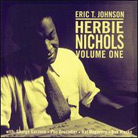July 2003
The first, Monk, takes his inheritance and profits from it (via fame and acceptance), thereby justifying the father’s faith. The other, Nichols, though just as talented, is never able to turn his inheritance into anything that benefits him financially during his lifetime, and then passes away -- a faintly remembered name written in the family bible. The years roll on and then, finally, due to the diligence of friends and family (and the release of a Mosaic set that prompts a re-evaluation) his work becomes more widely known. The spotlight that never quite found him while he was alive finally shines on him. He finally comes home. Jazz guitarist Eric T. Johnson is one of those friends whose efforts have aided in raising Nichols’ name and musical recognition factor. His latest CD, Herbie Nichols, Volume One, features an all-Nichols program recorded outside the piano-trio setting that was Nichols' only recording vehicle. Johnson pulls this off, in fact, without using a piano on this CD. Instead, his guitar is the focal point of these arrangements. And in addition to Bob Nieske on bass and Nat Mugavero on drums, Johnson mixes in the tonal colorations of Phil Grenadier’s trumpet and George Garzone’s tenor and soprano saxophones. Herbie Nichols, Volume One contains music to be savored, whether in bite-sized listens or the full CD-course helping. Johnson’s arrangements have brought out new and varied views of Nichols' music that should do nothing less than bring smiles to Nichols’ new (and old) fan base. Where Nichols' own recordings were of sparse, angular, outside-the-box piano trios, Johnson presents a more rollicking, accessible side of his music. But -- and this is what makes Herbie Nichols, Volume One such an interesting album -- he manages to accomplish this while preserving all the uniqueness that permeates Nichols’ writings. An excellent example of this is played out on the track "Love, Gloom, Cash, Love." Just listen to how Johnson’s guitar bounces along, carrying the music on its back, so to speak. And pay close attention to all the tonal colors evoked by the band. This isn’t background music -- it’s music that begs to be heard, on multiple levels, again and again, providing new joys with each listening session. And while you’re reveling in the glorious music, pay close attention to the sound as well. Actually, you won’t be able to ignore the sonic aspects of Herbie Nichols, Volume One. It’s so good it will draw you further into the music, allowing Nichols’ songs (and Johnson’s arrangements) to reach into and grab your musical soul. This is demo-quality stuff. Each instrument stands on its own, in its own acoustic space, with its uniqueness intact. The sound is crisp and clear with good depth to the soundstage. Bravo Summit, an excellent job. Eric Johnson’s Herbie Nichols, Volume One is a winner on all counts. It provides another avenue down which the listener can explore the music of one of jazz’s neglected masters in arrangements that would have pleased Nichols, who always wondered what his music might have sounded like taken beyond the trio setting. On top of that, it offers some of the best CD sound I’ve heard. This could very well become my choice for CD of the year -- it’s that good. While it’s been a long time coming, welcome home, Herbie. There will always be a place for you at my table. GO BACK TO: |
 Eric T. Johnson - Herbie
Nichols, Volume One
Eric T. Johnson - Herbie
Nichols, Volume One The Biblical
parable regarding the prodigal son can be applied to the life experiences of jazz
pianist/composer Herbie Nichols (1919-1963), if you is willing to stretch a point or two.
All you need to do is cast Blue Note Records owner Alfred Lion in the role of the father,
and pianists Thelonious Monk and Nichols as his two sons. Both receive their inheritance
from their father (Lion) in the form of recorded output, and both then leave the family
home (the label) and wander far afield.
The Biblical
parable regarding the prodigal son can be applied to the life experiences of jazz
pianist/composer Herbie Nichols (1919-1963), if you is willing to stretch a point or two.
All you need to do is cast Blue Note Records owner Alfred Lion in the role of the father,
and pianists Thelonious Monk and Nichols as his two sons. Both receive their inheritance
from their father (Lion) in the form of recorded output, and both then leave the family
home (the label) and wander far afield.